Neuroptera
Lacewings, antlions, owlflies, etc.
John D. Oswald


This tree diagram shows the relationships between several groups of organisms.
The root of the current tree connects the organisms featured in this tree to their containing group and the rest of the Tree of Life. The basal branching point in the tree represents the ancestor of the other groups in the tree. This ancestor diversified over time into several descendent subgroups, which are represented as internal nodes and terminal taxa to the right.

You can click on the root to travel down the Tree of Life all the way to the root of all Life, and you can click on the names of descendent subgroups to travel up the Tree of Life all the way to individual species.
For more information on ToL tree formatting, please see Interpreting the Tree or Classification. To learn more about phylogenetic trees, please visit our Phylogenetic Biology pages.
close boxReferences
Adams, P. A. 1958. Studies in the Neuroptera, with special reference to wing structure and evolution in the Osmyloidea. Ph.D. Dissertation. Harvard University, Cambridge, Massachussets. 120 pp. 16 plates with 79 figures.
Aspöck, U. 1992. Crucial points in the phylogeny of the Neuroptera (Insecta). Pp. 63-73 in Current Research in Neuropterology. Proceedings of the Fourth International Symposium on Neuropterology, M. Canard, H. Aspöck, and M. W. Mansell, eds. Toulouse. [Symposium held in Bagnères-de-Luchon, France, 1991.] 8 figures.
Aspöck, U. 2002. Phylogeny of the Neuropterida (Insecta: Holometabola). Zoologica Scripta 31(1):51-55.
Aspöck, U.; Mansell, M. W. 1994. A revision of the family Rhachiberothidae Tjeder, 1959, stat. n. (Neuroptera). Systematic Entomology 19:181-206. 53 figures.
Aspöck, U., J. D. Plant, and H. L. Nemeschkal. 2001. Cladistic analysis of Neuroptera and their systematic position within Neuropterida (Insecta: Holometabola: Neuropterida: Neuroptera). Systematic Entomology 26(1):73-86.
Brooks, S. J. 1997. An overview of the current status of Chrysopidae (Neuroptera) systematics. Deutsche Entomologische Zeitschrift 44(2): 267-275.
Handlirsch, A. 1906-1908 [various]. Die fossilen Insekten und die Phylogenie der rezenten Formen. W. Engelmann, Leipzig. 1430 pp. Several plates with neuropterid figures. Dating: From information on p. ix: "Ausgegeben wurde: 1. Lieferung, Bogen 1-10, Tafel 1-9 im Mai 1906. 2. [Lieferung, Bogen] 11-20, [Tafel] 10-18 [im] Juni 1906. 3. [Lieferung, Bogen] 21-30, [Tafel] 19-27 [im] August 1906. 4. [Lieferung, Bogen] 31-40, [Tafel] 28-36 [im] Oktober 1906. 5. [Lieferung, Bogen] 41-50, [Tafel] 37-45 [im] Februar 1907. 6. [Lieferung, Bogen] 51-60, [Tafel] 46-51 [im] Juni 1907. 7. [Lieferung, Bogen] 61-70 im November 1907. 8. [Lieferung, Bogen] 71-80 [im] Januar 1908. 9. [Lieferung, Bogen] 81-90 [im] Juli 1980."
Haring, E. and Aspöck, U. 2004. Phylogeny of the Neuropterida: a first molecular approach. Systematic Entomology 29:415–430.
Henry, C. S. 1978 [1979.??.??]. An unusual ascalaphid larvae (Neuroptera: Ascalaphidae) from southern africa, with comments on larval evolution within the Myrmeleontoidea. Psyche 85:265-274. 4 figures.
MacLeod, E. G. 1964. Comparative morphological studies on the head capsule and cervix of larval Neuroptera (Insecta). Ph.D. Dissertation. Harvard University, Cambridge, Massachussets, U.S.A. 528 pp.
Mansell, M. W. 1992. The systematic position of the Nemopteridae (Insecta: Neuroptera: Myrmeleontidae). Pp. 233-241 in Current Research in Neuropterology. Proceedings of the Fourth International Symposium on Neuropterology, M. Canard, H. Aspöck, and M. W. Mansell, eds. Toulouse. [Symposium held in Bagnères-de-Luchon, France, 1991.] 1 figure.
Martynova, O. M. 1949. Mesozoic lacewings (Neuroptera) and their bearing on concepts of phylogeny and systematics of the order [in Russian]. Akademia nauk SSSR. Trudy Paleontologicheskogo Instituta 20:150-170. 11 figures.
Martynova, O. M. 1952. Permian Neuroptera of the USSR [in Russian]. Akademia nauk SSSR. Trudy Paleontologicheskogo Instituta 40:197-237. 32 figures.
Meinander, M. 1972. A revision of the family Coniopterygidae (Planipennia). Acta Zoologica Fennica 136:1-357. 223 figures.
Riek, E. F. 1976. The family Stilbopterygidae (Neuroptera) in Australia. Journal of the Australian Entomological Society 15:297-302. 6 figures.
Willmann, R. 1990. The phylogenetic position of the Rhachiberothinae and the basal sister-group relationships within the Mantispidae (Neuroptera). Systematic Entomology 15:253-265. 27 figures.
Winterton, S. L. and S. J. Brooks. 2002. Phylogeny of the apochrysine green lacewings (Neuroptera: Chrysopidae: Apochrysinae). Annals of the Entomological Society of America 95(1): 16-28.
Withycombe, C. L. 1924-1925 [1925.02.20]. Some aspects of the biology and morphology of the Neuroptera. With special reference to the immature stages and their possible phylogenetic significance. Transactions of the Entomological Society of London 1924:303-411. 2 text figures and 6 plates with 37 figures. Dating: From note on reverse of title page of vol. 1924.
Zwick, P. 1967. Beschreibung der aquatischen Larve von Neurorthus [sic] fallax (Rambur) und Errichtung der neuen Planipennierfamilie Neurorthidae fam. nov. Gewasser und Abwasser 44/45:65-86. 10 figures.
Information on the Internet
- CAS Neuroptera
- NeuroWeb - The Neuropterist' Home Page
- The Antlions and Lacewings (Neuroptera) of South Africa
- The Antlion Pit - a doodlebug anthology
- AntLionFarms.com
- Neuropterida Species in California Entomology Collections
- Notes on the Neuroptera and Megaloptera of Madagascar and Adjacent Islands
- Introduction to Ant Lions
- The AntLion
- Evolution: Library: Isolating Mechanisms: Lacewing Songs Chrysoperla spp. (biocontrol using lacewings, Cornell University)
- Rearing lacewings
- Green lacewing pictures and information The Owlflies (Neuroptera: Ascalaphidae) of South Africa
- Neuroptera - Brisbane Insects and Spiders (Australia)
Title Illustrations

| Scientific Name | Climaciella brunnea |
|---|---|
| Creator | T. W. Davies |
| Specimen Condition | Live Specimen |
| Life Cycle Stage | Adult |
| Source Collection | CalPhotos |
| Copyright |
© 1999 California Academy of Sciences

|
| Scientific Name | Nymphes myrmeleonides |
|---|---|
| Location | Brisbane, Australia |
| Specimen Condition | Live Specimen |
| Life Cycle Stage | Adult |
| Copyright |
© Peter Chew

|
| Scientific Name | Myrmeleon pictifrons |
|---|---|
| Location | Bulimba Creek, Wishart, Australia |
| Comments | Antlion |
| Specimen Condition | Live Specimen |
| Life Cycle Stage | Adult |
| Copyright |
© Peter Chew

|
| Scientific Name | Nemoptera bipennis |
|---|---|
| Location | Peñaflor, Zaragoza, Spain |
| Specimen Condition | Live Specimen |
| Source | Nemoptera bipennis |
| Source Collection | Flickr |
| Image Use |
 This media file is licensed under the Creative Commons Attribution-NonCommercial-ShareAlike License - Version 2.0. This media file is licensed under the Creative Commons Attribution-NonCommercial-ShareAlike License - Version 2.0.
|
| Copyright | © 2008 Isidro Martínez |
| Scientific Name | Libelloides sp. |
|---|---|
| Location | Peloponnese, Greece |
| Comments | Owlfly |
| Specimen Condition | Live Specimen |
| Life Cycle Stage | Adult |
| Copyright |
© 2002 Michal Hoskovec

|
About This Page
John D. Oswald

Texas A&M University, College Station, Texas, USA
Page copyright © 1995 John D. Oswald
 Page: Tree of Life
Neuroptera. Lacewings, antlions, owlflies, etc..
Authored by
John D. Oswald.
The TEXT of this page is licensed under the
Creative Commons Attribution License - Version 3.0. Note that images and other media
featured on this page are each governed by their own license, and they may or may not be available
for reuse. Click on an image or a media link to access the media data window, which provides the
relevant licensing information. For the general terms and conditions of ToL material reuse and
redistribution, please see the Tree of Life Copyright
Policies.
Page: Tree of Life
Neuroptera. Lacewings, antlions, owlflies, etc..
Authored by
John D. Oswald.
The TEXT of this page is licensed under the
Creative Commons Attribution License - Version 3.0. Note that images and other media
featured on this page are each governed by their own license, and they may or may not be available
for reuse. Click on an image or a media link to access the media data window, which provides the
relevant licensing information. For the general terms and conditions of ToL material reuse and
redistribution, please see the Tree of Life Copyright
Policies.
Citing this page:
Oswald, John D. 1995. Neuroptera. Lacewings, antlions, owlflies, etc.. Version 01 January 1995 (temporary). http://tolweb.org/Neuroptera/8220/1995.01.01 in The Tree of Life Web Project, http://tolweb.org/




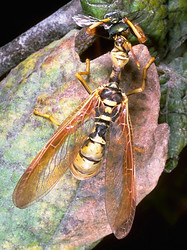
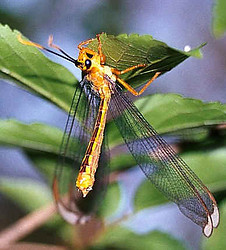
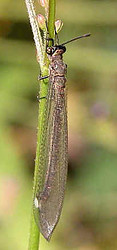
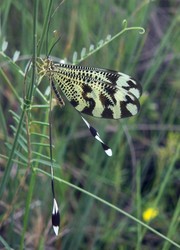
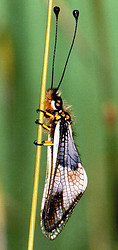






 Go to quick links
Go to quick search
Go to navigation for this section of the ToL site
Go to detailed links for the ToL site
Go to quick links
Go to quick search
Go to navigation for this section of the ToL site
Go to detailed links for the ToL site